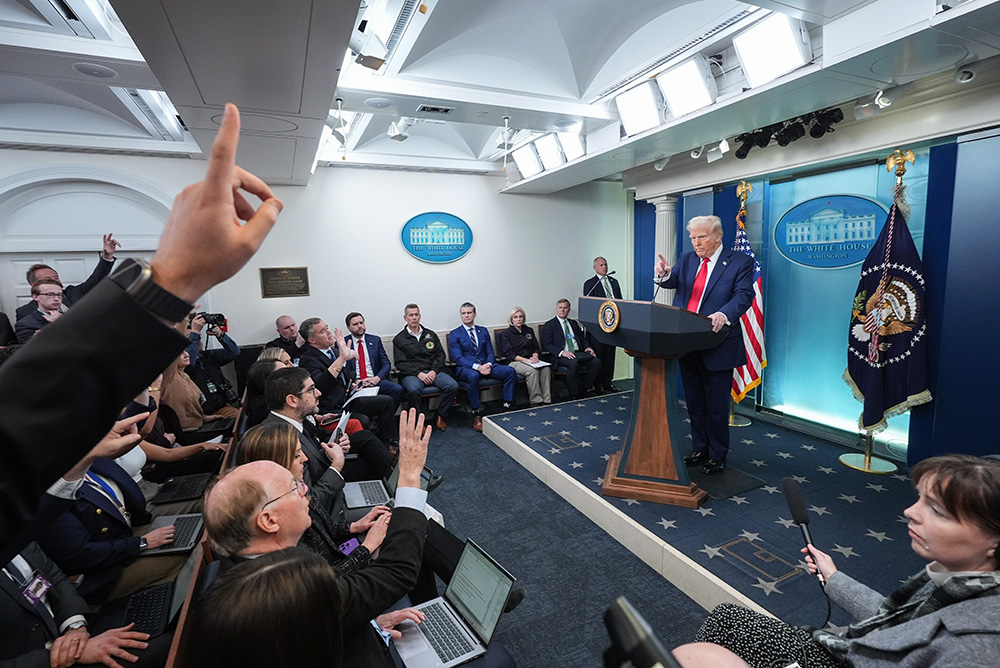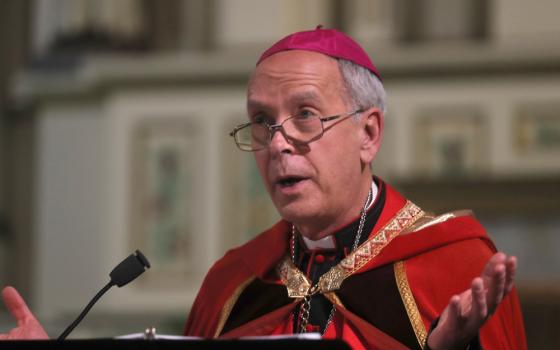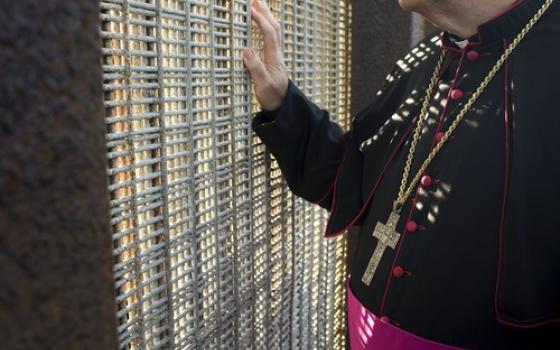
President Donald Trump speaks with reporters in the James Brady Press Briefing Room at the White House Jan. 30, 2025, in Washington. (AP/Jacquelyn Martin)
In a 2024 Pew survey, over 90% of Americans — across political, religious and cultural lines — agreed on one essential truth: a free and independent press is vital to the health of a democratic society. That conviction lies at the heart of the American experiment. From its inception, this nation was built upon the belief that truth matters. "We hold these truths to be self-evident" is not just a rhetorical flourish but a foundation.
But that foundation is cracking.
The recent actions and rhetoric of President Donald Trump constitute a deliberate and dangerous assault on the free press. These are not the stray provocations of a thin-skinned politician, but a sustained campaign to intimidate, manipulate and muzzle the institutions that hold power accountable.
Despite claiming to have "brought back free speech" and "stopped all government censorship," Trump's record tells a much darker story. His administration actively punishes independent journalists who refuse to play by his rules.
In one striking example, reporters from the Associated Press were barred from covering presidential events — not for ethical violations, but because they declined to rename the Gulf of Mexico at his jingoistic demand.
"Permitting the state to retaliate against news organizations for making an editorial choice the government disagrees with," warned Gabe Rottman of the Reporters Committee for Freedom of the Press on March 25 in Senate testimony, is "repugnant to the Constitution." Trump's behavior was not about geography; it was about control — the power to weaponize language and punish dissent.
Ironically, despite his campaign slogan, Trump shows no understanding of what truly makes America great. It is not brute power or personal loyalty. It is not obedience, spectacle or vengeance. What makes America great is its free institutions, its capacity for self-criticism, and, above all, its commitment to truth. When a president attacks those institutions, undermines truth, tells demonstrable lies, and treats honest disagreement as disloyalty, he does not strengthen the country — he endangers its soul.
A guiding and inspiring force in the founding of the National Catholic Reporter was a speech given in Rome in 1963 by the late Jesuit scholar and political philosopher John Courtney Murray. Though delivered to a symposium of Catholic journalists covering the church, the main point most certainly applies to American democracy.
Murray said that a free press is not a luxury, but a social necessity. In a democratic society, citizens have a right to know what their government is doing, and speak, hear and judge for themselves. That right is hollowed out when leaders manipulate press access, reward partisan loyalty, and sideline objective reporting.
Trump has pursued not an informed public but a loyal audience. He stacks press briefings with sycophantic outlets and freezes out skeptical reporters. His administration dispatches undercover immigration agents to snatch off the street a Turkish student a year after she co-authors a fairly wonkish college newspaper op-ed calling for divestment from Israel because of the war in Gaza. From the White House, Trump furiously blasts any journalist who dares to fact-check him or merely be on the receiving end of an errantly sent Signal text message about U.S. plans for a bombing raid.
Advertisement
These are not acts of statesmanship. They are tactics we expect from authoritarian regimes.
We cannot let this sinister behavior succeed.
Repeated attacks on "fake news," the labeling of a respected editor as "a sleazebag," the branding of independent reporting as "illegal," and threats of retribution have eroded public trust in journalism. Journalists — once honored as watchdogs of democracy — now face a hostile environment in which telling the truth can bring intimidation, online abuse and threats to personal safety.
Murray foresaw this danger. With scholarship formed from the ravages of the Second World War, the Jesuit priest argued that democracy depends on a shared commitment to fundamental values — a "constitutional consensus" rooted in truth and reason.
We believe this so passionately that we mailed Murray's speech to journalists out as a four-page flyer with NCR's first edition and republished on our first anniversary as "the best brief statement of the paper's function." We republish it again today online.
Public life dissolves into tribalism, paranoia and suspicion without that consensus. Trump's approach has not been to renew that consensus but to take a chainsaw to it — replacing facts with loyalty tests and civic discourse with grievance and spectacle.
And this brings us to a more profound truth: We are not only contending with deliberate evil but dangerous stupidity and incompetence. As history has shown, evil can sometimes be engaged with, resisted or redeemed. There can be dialogue. There is at least the hope for understanding. However, ignorance is far more insidious — it cannot be reasoned with, only countered through persistent truth-telling, vigilance and the patient work of public education and moral formation.
Today's crisis is compounded by the willful cruelty of authoritarian impulse paired with a dismissive disdain for learning, logical thinking, facts, virtues, moral principles and humility. It is a profoundly corrosive and toxic mix that has polluted politics and our public imagination.
That's all the more reason the role of a free press remains unchanged and urgent. Drawing on classical philosophy and Catholic social thought, Murray maintained that only virtuous people can be free. Freedom, rightly understood, is not the right to do whatever one pleases but the right to do what is necessary.
A free press is essential to cultivating that virtue. It enables dialogue. It fosters accountability. It challenges complacency. When power goes unchecked, free media speaks up. When power seeks to silence, a free press refuses to be quiet.
Trump's contempt for that role is not accidental — it is central to his method of governing. He degrades, insults, mocks and undermines journalists, sowing distrust. He uses state platforms to elevate propaganda while starving independent voices.
This is not partisan. This is a matter of national survival. If the press is not free, the people are not free.
Consider recent developments: the shuttering of Voice of America, an internationally respected source of news for those living under dictatorship and censorship, or the defunding of Radio Free Europe/Radio Liberty, a key player in countering authoritarian disinformation. These cuts do not strengthen American values — they broadcast weakness, isolation and fear while handing Russia's Vladimir Putin and China's Xi Jinping a long-sought propaganda victory.
Murray, whose work was deftly chronicled by Cardinal Robert McElroy and in countless academic articles, insisted that America is a nation "under God" — answerable to transcendent norms, not just to politics or polls. In that vision, the state does not grant rights such as freedom of speech and the press. They are inherent, inalienable, and are endowed by God. Any attempt to reduce these God-given rights to political favors of a sovereign — to be distributed or revoked by the dear leader based on loyalty — is a betrayal of both the Constitution and moral principles.
Trump's pattern — curating loyalty, punishing truth, silencing dissent — echoes the behavior of autocrats the world over. From Putin's Russia to Viktor Orbán's Hungary, the first step toward totalitarianism is always to undermine the press. Legal analyst Adrienne Lawrence said, "Every authoritarian regime in history has sought to control the press."
The United States is not immune.
In times of democratic crisis, Murray called for "high argument" — the kind of bold, honest debate rooted in truth and trust. But Trump offers no argument. Only insults. No vision. Only vendettas. No dialogue. Only defamation. He governs not through reason but through resentment.
That's why this moment matters. The American experiment has always been fragile. It depends not on the strength of any one leader but on its people's moral clarity and courage. It must be renewed in every generation — through vigilance, civic participation, and an unshakable commitment to truth.
The time to defend the free press is not tomorrow. It is now.
This is not partisan. This is a matter of national survival. If the press is not free, the people are not free. If the truth is silenced, justice cannot breathe. The editorial page, the investigative report, and the pointed question are not threats to the people. They are tools of liberation.
The pen is still mighty — but only if it can write freely.
The public must rise — not in violence, but in voice. Read independent journalism. Support it. Share it. Defend it. We must resist evil — and yes, we must also expose misinformation and disinformation, which clouds minds and weakens democracy.
For the future of this republic, the health of our moral vision, and the freedom of every citizen, we must stand now for the press.
And we must not back down.







